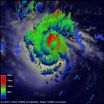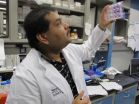(Press-News.org) People who have had kidney stones are twice as likely to need dialysis or a kidney transplant later in life, demonstrates recently published findings by medical researchers at the University of Alberta. Their article was recently published in the British Medical Journal.
Faculty of Medicine & Dentistry researchers Todd Alexander and Marcello Tonelli tracked data of more than three million Albertans over an 11-year period from 1997 to 2009. They discovered those with a history of kidney stones were twice as likely to have serious kidney problems later in life when compared to people who had never suffered from kidney stones. And women under the age of 50 who had a history of kidney stones were four times as likely to later develop kidney failure. Although the actual number of those who developed kidney failure was small, the link to having a history of kidney stones was noteworthy.
"I think what these results tell me, is that we should be screening those with a history of kidney stones for risk factors for the development of kidney disease," says Alexander, the study's first author and a practising pediatric nephrologist.
"I am not surprised by these findings because when you are passing a stone through a kidney, there is definitely the potential for permanent damage."
Based on their findings, between five and seven per cent of Albertans will develop a kidney stone in their lifetime, says Alexander. The data is more alarming in the United States where 10 to 11 per cent of the population develops kidney stones. Half of those who get kidney stones will have a reoccurrence – anywhere from one to several more episodes.
"It's important to note that the vast majority of people with kidney stones won't develop permanent kidney damage," adds Tonelli. "But a few will, and that's why it's important for people with stones to get proper follow-up care – to reduce their risk of another stone, and to detect kidney damage if it has occurred."
People could try to decrease the likelihood of the development of kidney stones by decreasing their sodium intake, drinking more water and, if needed, taking certain medication. It has been previously observed that those who develop kidney stones have kidneys that don't function at optimal levels, which is a factor in the whole issue.
Alexander is a researcher in the Department of Physiology and the Department of Pediatrics, while Tonelli holds a Canada Research Chair in the Department of Medicine's Division of Nephrology.
The primary funders of the research were: The Kidney Foundation of Canada, Alberta Innovates – Health Solutions, the University Hospital Foundation, and the KRESCENT program (a training and support program for kidney research scientists).
"We are proud to support outstanding and innovative research that helps us to improve our understanding of the possible risk factors for developing kidney failure," said Wim Wolfs, National Director of Research of The Kidney Foundation of Canada.
Other funding organizations were equally pleased with the research findings.
"We are deeply grateful for the tremendous community support that allows the University Hospital Foundation to support innovative research; to provide the seed funding required to pursue new and emerging fields of study," says Joyce Mallman Law, President of the University Hospital Foundation. "Todd Alexander and Marcello Tonelli's research is a tremendous example of the power of philanthropy to change and save lives by building new knowledge to treat and prevent disease."
### END
The Atlantic Ocean hurricane season spawned two hurricanes this week and NASA satellites have been monitoring them and providing valuable data to forecasters. NASA's TRMM satellite saw very heavy rainfall and powerful towering thunderstorms in Michael when the storm became a hurricane. Michael's wind speeds more than doubled in 24 hours and it is now a major hurricane on the Saffir-Simpson scale.
Tropical Storm Michael became a hurricane on Sept. 5 and NASA's Tropical Rainfall Measuring Mission (TRMM) satellite passed by and collected data on rainfall and cloud heights. ...
Sorting good data from bad is critical when analyzing microscopic structures like cells and their contents, according to researchers at Rice University. The trick is to find the right window of time through which to look.
A new paper by the Rice lab of Angel Martí, an assistant professor of chemistry and bioengineering, offers a methodology to optimize the sensitivity of photoluminescent probes using time-resolved spectroscopy. Martí and co-author Kewei Huang, a graduate student in his group, found their technique gave results nearly twice as good as standard fluorescence ...
Adding the monoclonal antibody bavituximab to docetaxel chemotherapy doubles overall response rate and improves progression-free survival and overall survival in late-stage non-squamous, non-small cell lung cancer (NS-NSCLC) patients who have already received one prior chemotherapy regimen, according to research presented at the 2012 Chicago Multidisciplinary Symposium in Thoracic Oncology. This symposium is sponsored by the American Society of Clinical Oncology (ASCO), the American Society for Radiation Oncology (ASTRO), the International Association for the Study of Lung ...
This press release is available in French.Researchers from the Guy Rouleau Laboratory affiliated with the CHUM Research Centre and the CHU–Sainte-Justine Research Centre have discovered the genetic cause of a rare disease reported only in patients originating from Newfoundland: hereditary spastic ataxia (HSA).
This condition is characterized by lower-limb spasticity (or stiffness) and ataxia (lack of coordination), the latter leading to speech and swallowing problems, and eye movement abnormalities. The disease is not deadly, but people start developing gait problems ...
Stage I, non-small cell lung cancer (NSCLC) patients who received radiation therapy have an increased median survival of 21 months compared to 16 months, and the percentage of patients who receive no treatment declined from 20 percent to 16 percent, respectively, when comparing the two eras evaluated, 1999-2003 and 2004-2008, according to detailed analysis of the SEER-17 (Surveillance Epidemiology and End Results, National Cancer Institute) national database presented at the 2012 Chicago Multidisciplinary Symposium in Thoracic Oncology. This symposium is sponsored by the ...
Stage III non-small cell lung cancer (NSCLC) patients treated with surgery and/or radiation therapy have a significantly reduced risk of developing brain metastases if they also receive prophylactic cranial irradiation (PCI); however, this study did not show an improvement in overall survival with PCI, according to research presented at the 2012 Chicago Multidisciplinary Symposium in Thoracic Oncology. This symposium is sponsored by the American Society of Clinical Oncology (ASCO), the American Society for Radiation Oncology (ASTRO), the International Association for the ...
TORONTO, Sept. 6, 2012 – Imagine that the players on your favourite football team were smaller than their opponents, and had to play without helmets or pads. Left defenseless, they would become easy prey for other teams. Similarly, changes in Canadian lake water chemistry have left small water organisms vulnerable to their predators, which may pose a serious environmental threat, according to a new study.
"At low calcium levels the organisms grow slower and cannot build their armour," says study lead author Howard Riessen, professor of biology, SUNY College at Buffalo. ...
Treatment with pemetrexed, carboplatin and bevacizumab followed by maintenance pemetrexed and bevacizumab (Pem+Cb+B) is no better than standard therapy with paclitaxel, carboplatin and bevacizumab followed by bevacizumab (Pac+Cb+B) in patients with advanced non-squamous non-small cell lung cancer (NS-NSCLC), according to research presented at the 2012 Chicago Multidisciplinary Symposium in Thoracic Oncology. This symposium is sponsored by the American Society of Clinical Oncology (ASCO), the American Society for Radiation Oncology (ASTRO), the International Association ...
SAN ANTONIO (Sept. 6, 2012) — RSV, a virus that causes respiratory infections in infants and young children, selectively kills cancer cells while leaving healthy cells alone, researchers from the School of Medicine at The University of Texas Health Science Center San Antonio said.
Santanu Bose, Ph.D., of the School of Medicine, is the inventor on a pending U.S. patent of RSV as an oncolytic therapy. This represents a new use for the virus. Bandana Chatterjee, Ph.D., of the School of Medicine and the South Texas Veterans Health Care System, is the co-inventor. Oncolytic ...
Every ten years or so, someone will make the observation that there is a lack of political diversity among psychological scientists and a discussion about what ought to be done ensues. The notion that the field discriminates against and is skewed toward a liberal political perspective is worthy of concern; scholars, both within and outside the field, have offered various solutions to this diversity problem.
As psychological scientists Yoel Inbar and Joris Lammers point out, however, we have few of the relevant facts necessary to understand and address the issue.
In ...

